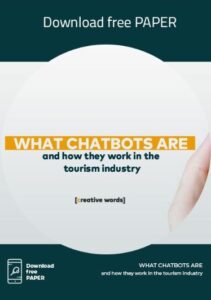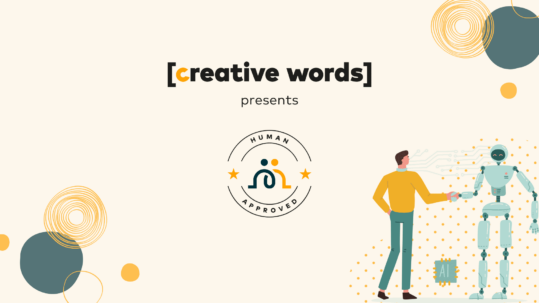
09 Dec Chatbots and tourism: from user experience to customer care management
What is the relationship between chatbots and tourism? First let’s take a step back: have you ever talked to a chatbot?
Imagine you want to go on a holiday: you’re on the couch fantasising about how to spend your well-deserved holiday time. The first thing we all definitely do is pick up the phone or computer and independently search for solutions that best suit our needs: what destination to choose, how to get there, where to stay and why.
Now imagine that you have a thousand questions about each of the above points. You’re probably ready to give up and need a holiday from organising the holiday itself.
But what if there was a way to avoid this?
Well, it just so happens that something like this has already been not only thought of and developed but is also increasingly popular, so much so that it is considered the new frontier of customer communication. The technology in question is precisely chatbots, which we will consider here in relation to tourism.
But what is a chatbot?
A chatbotis basically artificial intelligence software that can communicate with customers through various messaging applications (Facebook Messenger, WhatsApp, Wechat), as well as on the same site implementing it.
 The underlying technology is Natural Language Processing (NLP), in the middle between linguistics, computer science and artificial intelligence, which deals with programming computers so that they interpret and understand the content of textual documents even in their contextual nuances.
The underlying technology is Natural Language Processing (NLP), in the middle between linguistics, computer science and artificial intelligence, which deals with programming computers so that they interpret and understand the content of textual documents even in their contextual nuances.
You know that window that pops up when you click on certain websites, asking how it can help you? Well, you’ve had your experience with a chatbot.
The next step is to understand how chatbots and tourism combine their respective worlds.
In general, artificial intelligence has become one of the hottest topics in almost every field of knowledge, and obviously linguistics is no exception. If you’re curious about its different applications in this area, you can find an article in our blog about just that.
How do chatbots and tourism intersect?
A practical example of how chatbots and tourism work together involves a hotel website that can answer preset questions such as: “Can I bring pets?”, “Is there wi-fi?”, ” Is breakfast included?” And many more.
By this point in the article you’ve undoubtedly already at least guessed the scope of this new tool, especially in the field of tourism. We live in a reality in which everything is within reach of smartphones, which have now become a natural appendage of our upper limbs in a potentially irreversible way.
Anything that comes to mind, whether a curiosity or a doubt, can be searched within various search engines and quench our thirst for information within seconds.
You don’t have to be particularly good at math to understand how much time and resources would be saved, or how much productivity and profits could be increased if the same principle could be applied to the tourism industry. In fact, a chatbot could simultaneously answer the questions or concerns of hundreds of users at the same time, not to mention the importance of the amount of data it could collect from potential customers during the conversations, useful for marketing and sales strategies.
What wonders would a multilingual chatbot be able to accomplish in the tourism industry?
If you believe in the power of localisation and the importance of tourism translation, you can’t help but be excited about the results that artificial intelligence applied to languages has achieved with the latest chatbot software; and if you have a website, you’ll definitely want to enhance it by adding this service, having it translated and localised into more than one language.
In this regard, we published a case study which, in addition to thoroughly explaining how chatbots work, shows some examples of this tool already in use within the systems of various companies in the tourism sector and their excellent results.
Click the image and download the free case study!
 A multilingual chatbot would be able to simultaneously interact 24/7 with multiple customers from all over the world, offering them the best possible browsing experience as well as all the necessary support and assistance, which only customer service in their own language can comprehensively provide.
A multilingual chatbot would be able to simultaneously interact 24/7 with multiple customers from all over the world, offering them the best possible browsing experience as well as all the necessary support and assistance, which only customer service in their own language can comprehensively provide.
In the case of a localised chatbot, “interacting” therefore means getting in touch with users by providing them with all the help and information they need, while trying to reduce the linguistic and cultural distance between the parties.
Conclusions
If you have a business, all the more so in the tourism sector (which depends on customer engagement more than others), a chatbot is an investment that will surely provide an important economic return worth considering. In addition to expanding the market to sell your services in, the implementation of this service allows for a reduction in the number of staff, who regardless wouldn’t be able to perform as well as this artificial intelligence tool.
As in the case of your e-commerce and, in general, the service you want to offer, it is essential to be sure of a correct, professional and effective translation, which cannot be left to inexperienced hands.
Creative Words has always had a special regard for artificial intelligence. Chatbots are just one of many examples of the products it has worked on, in addition to having a great deal of experience in tourism translation and localisation.
Want to make sure we’re right for you? Contact us by filling out this form and have all your questions answered!





